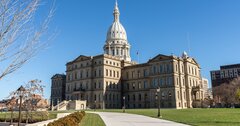
A Wall Street Journal editorial last weekend described one of the rationalizations used to promote Obamacare’s massive expansion of the Medicaid health-welfare program to include childless adults and families with incomes up to 138 percent of the poverty level. Under the “Affordable Care Act” as written by Congress, the expansion was mandatory for states, but the Supreme Court’s rewriting of the law last June made it optional.
Some politicians, among them Ohio Gov. John Kasich, now argue that states accepting the expansion today could reverse their decision later if things don’t work out. The Journal dissects the legal arguments of the Supreme Court’s ruling to warn that, like a “roach motel,” states may find it easy to enter the expansion but impossible to leave, regardless of what havoc it wreaks on their budgets in future years.
However, it’s not necessary to resort to speculative legal theorizing to question the “states can check-out later” claim, because last week the federal government itself provided much more concrete evidence against it. It did so by refusing to allow the bluer-than-blue state of Connecticut to make a modest money-saving adjustment to an earlier pre-Obamacare Medicaid expansion the state had adopted.
As Josh Archambault describes in Forbes, Connecticut’s expansion was intended to cover families with children who are no longer minors but are still claimed as dependents. Apparently some were dropping private insurance for these young adults — many of whom are attending college — so as to dump their cost of coverage onto taxpayers. In effect, rather than reducing the number of “uninsured,” the availability of this health care welfare program was “crowding out” private sector insurance these families were able to afford. (Some scholarly research suggests as much as 82 percent of the Medicaid expansion will similarly involve such cost-shifting.)
Seeking to curb the abuse, last summer Connecticut sought a “waiver” from the feds (who picked up half the cost of the expansion) to include the parents’ income and assets when considering the eligibility of these college-aged young adults for the program. The adjustment would have saved state taxpayers $66 million over two years, but last week the state got the answer to its “Mother-may-I” request to the feds: NO.
Importantly, nothing in the law requires a state to extend Medicaid coverage to this above-poverty level population. By denying the Connecticut reform, the feds made it clear that going forward, any Medicaid expansion must be regarded as a de facto “roach motel” — once a state gets in, it can never get out. Claims that the Obamacare expansion will be treated any differently must be viewed as either naïve or cynical.
In the short term, accepting the expansion will save states money, thereby allowing politicians to spend more on other programs. In Michigan, it will free up around $200 million in next year’s budget (half of which Gov. Snyder wants to put in a “lock box” to cover higher state costs the expansion begins to impose starting in 2017). This temporary loot is the “attractive nuisance” that has caused previously anti-Obamacare Republican governors like John Kasich and Rick Scott in Florida to become implementation collaborators.
Given Michigan’s legislative term limits, the temptations are even stronger for our legislators to accept these pieces of Obamacare silver, since many will no longer be in office when the higher costs hit. Alas, there are no term limits on the burdens Michigan taxpayers will have to carry for decisions made today that are very likely irrevocable in the future.
Get insightful commentary and the most reliable research on Michigan issues sent straight to your inbox.

The Mackinac Center for Public Policy is a nonprofit research and educational institute that advances the principles of free markets and limited government. Through our research and education programs, we challenge government overreach and advocate for a free-market approach to public policy that frees people to realize their potential and dreams.
Please consider contributing to our work to advance a freer and more prosperous state.